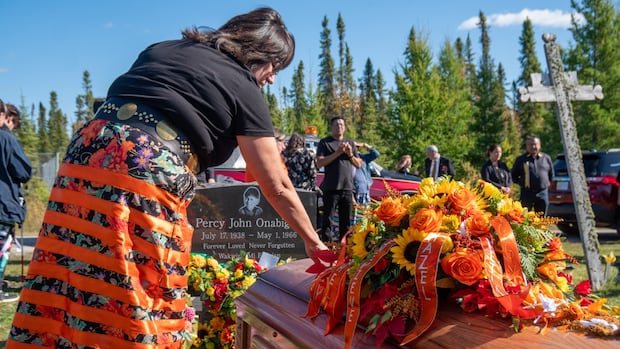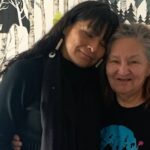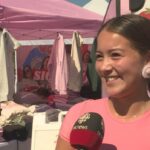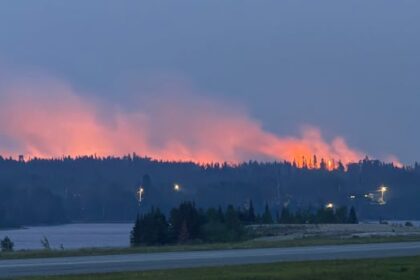WARNING: This story contains references to the Indian residential school system.With the repatriation of his remains, Percy Onabigon is finally home and reunited with his late siblings in Long Lake #58 First Nation — decades after he was separated from them, put in a residential school and buried over 1,200 kilometres from the Ojibway community in northwestern Ontario.Last week, Percy’s remains were escorted by the Ontario Provincial Police’s truth and reconciliation vehicle to Long Lake #58, where his life was celebrated and he was interred in his final resting place.His family’s fight to repatriate his remains at the First Nation where he was born took place over many decades. After he spent time in St. Joseph’s Indian Residential School in Thunder Bay, he was sent to a number of hospitals and institutions because he was epileptic and partially paralyzed.His family was never told where he was sent or what became of him after he was removed from St. Joseph’s. But after years of research and advocacy, Percy’s niece, Claire Onabigon, found him in a cemetery in Woodstock, Ont. He had died at age 27 of tuberculosis at the Ontario Hospital.The final chapter to the repatriation of Percy’s remains came ahead of the Sept. 30 National Day for Truth and Reconciliation.Celebrating Percy’s life”He must be saying, ‘They found me. I’m home now,'” Claire said as family and friends honoured him Thursday through a pipe ceremony, speeches, a presentation about his life and prayers — with photos of him and his relations on display.His casket was adorned by a bouquet of flowers featuring orange ribbons with his siblings’ names on them. The next day at a Catholic church ceremony, hymns were sung in Anishinaabemowin as a priest smudged him with traditional medicines.At Long Lake’s cemetery, people placed tobacco on Percy’s grave before he was interred.Percy, who was born on July 17, 1938, had a twin brother Harold who died in infancy. There were also two other brothers and six sisters. Percy was eight years old when he was separated from his family without their knowledge or consent.His family exhumed his remains this spring. Claire spent years fighting for funds to repatriate his remains, receiving support from several community leaders and Anishinabek Nation. The family was denied federal funding through the Residential Schools Missing Children Community Support Fund because he died as an adult rather than as a child while attending St. Joseph’s.Rev. Hugo Tremblay leads smudging ceremony for Percy Onabigon during Friday’s funeral service. (David Jackson/CBC)”In cases where the federal government is not able to provide funding through the Community Support Fund, Crown-Indigenous Relations officials look for other funding alternatives, including with Indigenous Services Canada and/or the relevant province or territory,” a spokesperson for the federal government’s department of Crown-Indigenous Relations told CBC News in an email on Thursday.Last fall, members of the Ontario government met with the family in Long Lake #58 and agreed to pay $45,000 to bring Percy’s remains home.”It wasn’t much of a decision — it was obvious that we should and would participate,” Greg Rickford, Ontario’s minister of Indigenous affairs and First Nations economic reconciliation, told CBC News on Friday.The long road homePercy’s journey itself took him more than 1,800 kilometres across the province — from the cemetery in Woodstock, to Ontario’s Forensic Pathology Service in Toronto for an autopsy and DNA analysis, to Everest Funeral Chapel in Thunder Bay and then northeast to Long Lake #58.Long Lake #58 First Nation is along Highway 11 in northern Ontario next to the town of Longlac. (David Jackson/CBC)”The pain, the sadness and the loneliness that Percy went through is all real,” Claire said. “He must have wondered, ‘Where’s my mom? Where’s my dad? Where is my sister? Where are my brothers?’ Every day just waking up and thinking, ‘Is today the day they come to get me?'”Elder Jocelyn Bananish, who was born the same year as Percy, said she remembers playing with him before he was sent to St. Joseph’s.”He was just like a brother to me. I didn’t even know he left,” Bananish said. “I just missed him.”Const. Brian Frost of Ontario Provincial Police (OPP) drove the service’s truth and reconciliation vehicle to escort Percy’s remains to his repatriation service in Long Lake #58 First Nation. Frost is the training and policy co-ordinator for the OPP’s Indigenous Policing Bureau. (David Jackson/CBC)Support for other reburialsPercy’s story was first shared in Kimberly Murray’s report Sites of Truth, Sites of Conscience while she was Canada’s independent special interlocutor for missing children and unmarked graves and burial sites associated with Indian residential schools.Murray, who is now a national scholar for Indigenous legal studies at Queen’s University in Kingston, has long called for both provincial and federal legislation outlining government obligations for repatriation, each with funding attached to it.Percy was 27 years old when he died of tuberculosis. The last time his family saw him was when he was at St. Joseph’s Indian Residential School in Thunder Bay. (David Jackson/CBC)”Percy’s experience and his family’s experience is an interesting one to look at because of the interrelation between the federal and provincial governments, and the fact that there were so many institutions that touched Percy’s life,” said Murray, a member of Kanesatake Mohawk Nation. Rickford said Ontario has “led the way nationally” with its support for those affected by the Indian residential school system, particularly through the Indian Residential School Community Engagement Fund.Sol Mamakwa is a member of provincial parliament (MPP) for Kiiwetinoong and a member of Kingfisher Lake First Nation, and was at last week’s repatriation ceremony for Percy.Mamakwa, a residential school survivor, said the only other repatriation ceremony he had attended was for 13-year-old Charlie Hunter in 2011. Hunter died in 1974 while attending St. Anne’s Residential School in Fort Albany.Kiiwetinoong MPP Sol Mamakwa travelled to Long Lake #58 First Nation for Percy’s repatriation service. Mamakwa says he wants to see provincial and federal legislation that makes it easier for families to repatriate lost relatives. (David Jackson/CBC)Mamakwa said he’d also like provincial and federal repatriation laws put in place that align with the United Nations Declaration on the Rights of Indigenous Peoples.”That it’ll be easier for families that want to bring their children home.” Judy Desmoulin, chief of Long Lake #58 First Nation, has supported the Onabigons throughout Percy’s journey and said she hopes others can draw from the family’s experience.”Hopefully by what we’ve done, we’ve paved that way a little bit,” Desmoulin said. “Now that we know what needs to get done, then we can share that information, so hopefully it’ll speed up the process for others to do what we’ve done.”Chief Judy Desmoulin of Long Lake #58 First Nation says she hopes Percy’s repatriation sets a precedent for other families looking to bring lost loved ones home. (David Jackson/CBC)’Never give up hope’It wasn’t easy for the Onabigons to talk about what happened to Percy.They’ve received messages from residential school denialists that experts say downplay, excuse or misrepresent facts about the harms caused by the Indian residential school system.”It’s really important that we share the information that we know from the facts, and the evidence and the records that we have,” Murray said. “It shouldn’t be families having to share their family history and experience with Canadians — it’s very personal. It’s very traumatic for them.”Percy’s family members were among those at the reburial at the Longlac Cemetery in northern Ontario. (Sarah Law/CBC)The family faced many challenges navigating archival documents to find out what happened to Percy, which Anishinabek Nation’s Grand Chief Linda Debassige said is a common experience.”If you speak to anyone who has conducted First Nations genealogical research, you will hear about the chronic misspelling of Indigenous names, the anglicizing of our names, the many incorrect or mismatching years for deaths, births and marriages, death certificates for people who are living or no birth certificates for those who have passed away, and mixing up of siblings or cousins’ names,” Debassige told CBC News in an emailed statement.”All of this demonstrates the complete lack of care and consistency that went into recording our people. Our records were not recorded by us; they were recorded by the very people who deemed us to be inferior, so the records will reflect that and not tell the whole story.”Nishnawbe Aski Nation Deputy Grand Chief Anna Betty Achneepineskum attended the repatriation service for Percy Onabigon in Long Lake #58 First Nation. (David Jackson/CBC)Anna Betty Achneepineskum, a deputy grand chief of Nishnawbe Aski Nation and a member of Marten Falls First Nation, an Anishinaabe First Nation in northern Ontario, said sharing stories like Percy’s and listening to community members’ testimonies helps combat denialism while empowering communities. “Until that time comes where more people accept the history of Canada, then perhaps First Nations people will not face the systemic racism that they do in this country,” Achneepineksum said. These are our homelands, and yet we are still marginalized by the systemic racism that exists.”Despite the obstacles the family has faced, Claire said bringing Percy home was a promise she made to her mother, who raised her with the mentality that “if you say you’re going to do something, you have to do it — and you have to do it right.”For others looking to repatriate their lost loved ones, she said, “I hope it doesn’t take as long as it took for us.”The message to them would be — never give up hope.”A national Indian Residential School Crisis Line has been set up to provide support for former students and those affected. People can access emotional and crisis referral services by calling the 24-hour national crisis line: 1-866-925-4419.Mental health counselling and crisis support is also available 24 hours a day, seven days a week through the Hope for Wellness hotline at 1-855-242-3310 or by online chat at www.hopeforwellness.ca.
Thursday, 5 Mar 2026
Canada – The Illusion
Search
Have an existing account?
Sign In
© 2022 Foxiz News Network. Ruby Design Company. All Rights Reserved.
You May also Like
- More News:
- history
- Standing Bear Network
- John Gonzalez
- ᐊᔭᐦᑊ ayahp — It happened
- Creation
- Beneath the Water
- Olympic gold medal
- Jim Thorpe
- type O blood
- the bringer of life
- Raven
- Wás’agi
- NoiseCat
- 'Sugarcane'
- The rivers still sing
- ᑲᓂᐸᐏᐟ ᒪᐢᑿ
- ᐅᑳᐤ okâw — We remember
- ᐊᓂᓈᐯᐃᐧᐣ aninâpêwin — Truth
- This is what it means to be human.
- Nokoma











